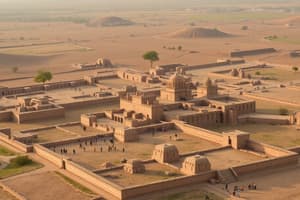Podcast
Questions and Answers
What is one of the prominent hypotheses explaining the decline of the Harappan Civilization?
What is one of the prominent hypotheses explaining the decline of the Harappan Civilization?
- Environmental factors such as changes in river courses (correct)
- Religious conflicts
- Economic collapse due to trade disruptions
- Disease outbreaks
What is the timeframe of the flourishing of the Harappan Civilization?
What is the timeframe of the flourishing of the Harappan Civilization?
- From around 4000 BCE to 1000 BCE
- From around 2000 BCE to 500 BCE
- From around 2500 BCE to 1500 BCE
- From around 3300 BCE to 1300 BCE (correct)
What was a significant achievement of the Harappan Civilization in terms of urban planning?
What was a significant achievement of the Harappan Civilization in terms of urban planning?
- Advanced weaponry manufacturing
- Tall defensive walls
- Sophisticated drainage systems (correct)
- Large-scale irrigation canals
What is the status of the writing system of the Harappan Civilization?
What is the status of the writing system of the Harappan Civilization?
What is indicated by the presence of defensive structures in some Harappan cities?
What is indicated by the presence of defensive structures in some Harappan cities?
What is a suggested environmental factor that may have contributed to the decline of the Harappan Civilization?
What is a suggested environmental factor that may have contributed to the decline of the Harappan Civilization?
What is the status of the writing system of the Harappan Civilization?
What is the status of the writing system of the Harappan Civilization?
What is a potential consequence of the environmental challenges faced by the Harappan Civilization?
What is a potential consequence of the environmental challenges faced by the Harappan Civilization?
What does the presence of defensive structures in some Harappan cities imply?
What does the presence of defensive structures in some Harappan cities imply?
What is a significant timeframe for the flourishing of the Harappan Civilization?
What is a significant timeframe for the flourishing of the Harappan Civilization?
Flashcards are hidden until you start studying
Study Notes
Decline of the Harappan Civilization
- One prominent hypothesis explaining the decline of the Harappan Civilization is a suggested environmental factor, such as a change in the course of the Indus River or a dramatic decrease in rainfall.
Flourishing of the Harappan Civilization
- The timeframe of the flourishing of the Harappan Civilization is approximately 2600-1900 BCE.
Urban Planning Achievements
- A significant achievement of the Harappan Civilization in terms of urban planning is the sophisticated drainage system and well-planned cities, indicating a high degree of urban planning and architecture.
Writing System
- The status of the writing system of the Harappan Civilization remains undeciphered, meaning the meaning of the script has not been fully understood or translated.
Defensive Structures
- The presence of defensive structures in some Harappan cities implies the need for protection from external threats or invaders.
Environmental Challenges
- A potential consequence of the environmental challenges faced by the Harappan Civilization is the decline of the civilization itself, as the civilization may not have been able to adapt to the changing environmental conditions.
Defensive Structures Implication
- The presence of defensive structures in some Harappan cities implies a sense of insecurity and the need for protection from external threats.
Studying That Suits You
Use AI to generate personalized quizzes and flashcards to suit your learning preferences.




